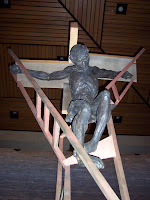 I coordinate the call process for the Northern Illinois Synod. It scares me to even say those words. It is a huge task. However, I have the help of our bishop, Sandy (full-time assistant to the bishop), Kurt (our Director of Evangelical Mission) and our six part-time conference assistants to the bishop. We all work together in assisting the call committees of congregations as they seek new pastors or other rostered leaders.
I coordinate the call process for the Northern Illinois Synod. It scares me to even say those words. It is a huge task. However, I have the help of our bishop, Sandy (full-time assistant to the bishop), Kurt (our Director of Evangelical Mission) and our six part-time conference assistants to the bishop. We all work together in assisting the call committees of congregations as they seek new pastors or other rostered leaders.I am always asked how pastoral candidates for a particular congregation are identified. There are four ways. First, we are aware of pastors from within our synod who are interested in serving a new parish. Second, thanks to a new system implemented last year, we also have access to the Rostered Leader Profiles (RLP) of any pastor in the ELCA who has expressed a desire to serve in our synod or region. In fact, we can access the RLP for any pastor who is seeking a call, so if we are looking for a particular skill set, we can engage in a churchwide search. Third, a congregation is free to raise names. Those names are submitted to me and then we follow a prescribed protocol. And finally, again because of the new system, pastors are able to search for open parishes and contact me for more information.
This past Wednesday and Thursday I participated in Region 5’s Mobility Conference. In the conference, the twelve synods of the region are represented by their bishop and an assistant. We are divided into two groups, each with six bishops and six bishop’s assistants. Each synod is permitted to bring two rostered leaders who are open to serving anywhere in the region for an interview. It must be somewhat intimidating to face six bishops and six assistants. I have heard some tough questions asked. Perhaps I have offered a few of my own.
I do know that mobility is a bit slow right now. Part of that is attributable to the economy. It is not a good time to try to sell a house; nor is it a good time for a spouse to be seeking employment. Rural congregations with a parsonage seem to be at an advantage, but that advantage is often offset by the disadvantages of lower compensation and fewer employment opportunities for spouses.
In our synod, we are very grateful for the work of our interim pastors. They are able to sustain ministry and offer experienced leadership for congregations in transition.
Every congregation of our synod is valued for what it is and who its people are. We work with each congregation to best fulfill its needs. Sometimes the call process is long. Sometimes it is frustrating. But, in every congregation, we trust the Holy Spirit and the people of God to call the pastor who will lead faithfully, creatively, and lovingly.
Comments? Go to http://niselca.blogspot.com/. --JC

Pastor Jeff,
ReplyDeleteThank you for the information in the last two blogs. I always thought interim pastors had to have special gifts and personalities. They arrive at a congregation either behind the absence of a beloved pastor or in the shadow of a conflict. Then, they have to learn the ropes, which includes "who is who" within a congregation. Just when things are going, they have to leave. Hard stuff! It is good to know the synod takes special care to equip them for the call.
It is equally good to know how serious the synod takes the call process. Both for the congregation and the called individual, it is important to come to a good fit.
Thanks to all who work in the NIS office. You are in my daily prayers!